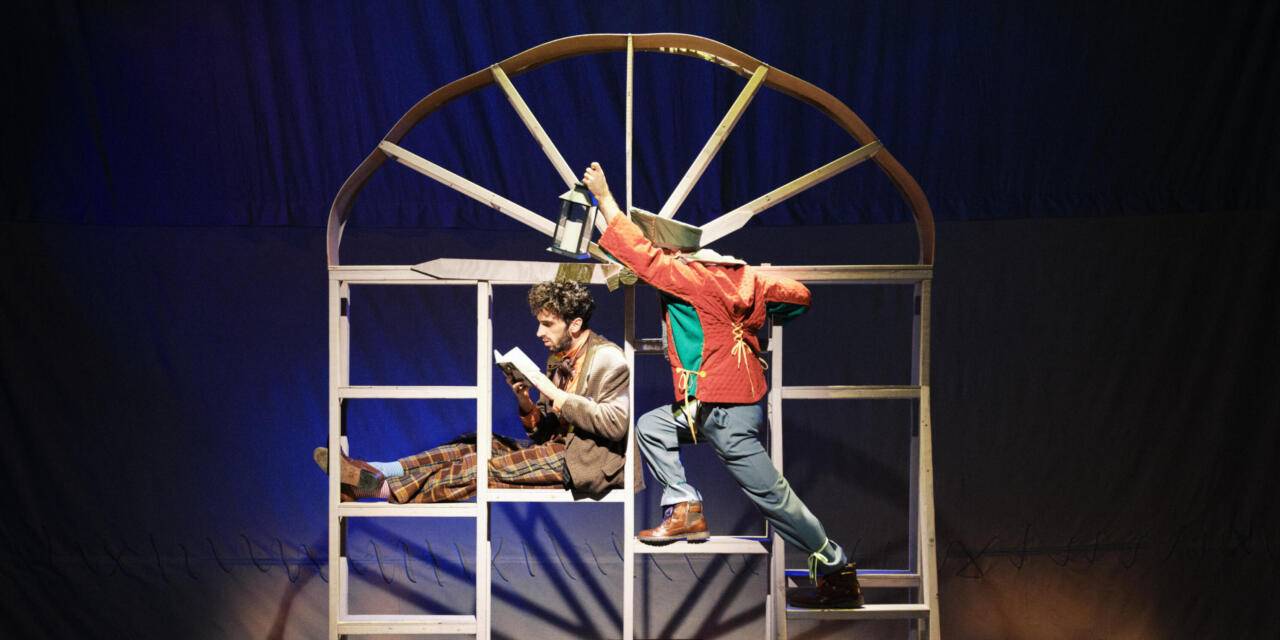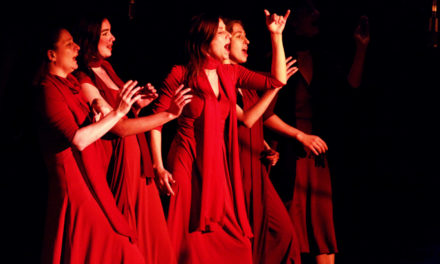Cruel war rages on without an end; another bloody war has just started. This is our world today. Amid suffering and violence, we yearn for another world—one without war. Even if it’s unattainable, imagining such a world could be a consolation. In a similar situation, in 1944, in the midst of the Second World War and Holocaust, Romanian playwright Mihail Sebastian (pen name of Iosif Hechter) imagined the idyllic pre-war world of 1913. Thus his play A Star without a Name about love and life came into a world of hatred and death.
“The world is full of pain as is. Instead—let’s talk about love,” states the flyer of the PM Theater’s show A Star without a Name by Mihail Sebastian. The play, directed by Gera Sandler and produced by Sergey Nagorny, premiered off-Broadway at the Theatre at St. Clements on November 8, 2023. The PM Theater embodied a dream of another world on stage for many of us. Moreover, they realized a personal dream of Ilya Eckstein (1977-2021). Ilya’s dream was to return to his younger years as an aspiring actor playing a role in Sebastian’s production in St. Petersburg, Russia. Ilya wanted to share with others his fascination with the play and with the capacity of theater to make everything possible. Like Udrea, another dreamer and character from “A Star without a Name,” he established The Eckstein Family Fund to realize his dream. And it did, now after Ilya’s tragic, premature death at the age of 44.

Station manager (Sergey Nagorny, center) and townspeople. Photos by Alexander Karnyukhin.
The play is both timely and timeless. Time, represented by many clocks, watches, and even the train schedule, both plays an important role and frames the show. However, these numerous timepieces do not show or count actual time. Instead, they help spectators feel it by recounting and giving meaning to the days, hours, and seconds: a conversation by the window during the day is mere socialization, whereas small talk in the night turns into meaningful dialogue when people may fall in love. The life of the provincial town where the play is situated revolves around the train schedule. Trains come and go, some stop at the town’s station, some rush through. The characters of the townspeople go about their lives on the same railroad tracks in a manner of puppet figures in a music box carousel. Set, costumes, and sound designed by Jenya Shekhter, Luna Gomberg, and Masha Vasilevskaya respectively, emphasize the clockwork movement of spectacular characters (reminiscent of Serge Soudeikine’s 1921 set and costume design for Igor Stravinsky’s “Korobochka”). The promise of amusement and comfort in such “another world” is irresistible. One can easily fit by changing a costume, values, lover, or even by going slightly mad to mix in with the local madmen—Teacher (Stephen Ochsner) and Udrea (Dima Koan).

Teacher (Stephen Ochsner, left), Pascu (Carlo Velardi, center), and Station manager (Sergey Nagorny, right). Photos by Alexander Karnyukhin.
The possibility of another world, full with its opportunities, strikes a chord with urbanite Mona (Anya Zicer), an outsider in the imaginary town of the play. This sentiment strikes a chord with many in today’s real world, particularly for many immigrants such as myself. We would never take seriously the complaints about this place by disillusioned locals, similar to how Mona is skeptical about Mademoiselle Cucu (Ronit Asheri-Sandler) calling her town a “swamp.” As the Teacher put it, “This adventure we call life is repeated differently—under the same sky, but with a different destiny. Perhaps, everything that here is hard—there, is easy; everything that is dark and bleak here—becomes bright and joyful there. Everything … is simple and possible there.” This approach worked out for many. However, others’ attempted escapes to another world ended in failure—a random deviation from the original life trajectory.
The question, if escaping to another world is the only way to change one’s life, is Chekhovian, asked more than one hundred years ago in the “Three Sisters.” The PM Theater’s production of “A Star without a Name” gives this question a Shakespearean answer: you cannot change life because you cannot alter fate, like a star that cannot change its orbit. However, the creators of the show add: another world, with all its strangeness and love, can profoundly change you. Although you are bound to return to your own world, your life and fate in it will never be the same.
This post was written by the author in their personal capacity.The opinions expressed in this article are the author’s own and do not reflect the view of The Theatre Times, their staff or collaborators.
This post was written by Vassili Schedrin.
The views expressed here belong to the author and do not necessarily reflect our views and opinions.


















